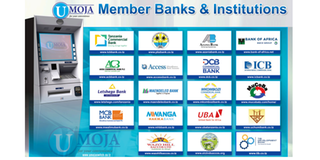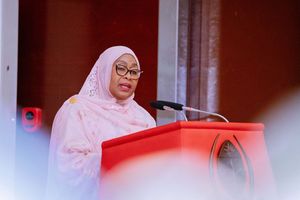Why UmojaSwitch makes strides with financial inclusion agenda

By Maliki Muunguja
The three years of President Samia in office have been of significant blessings in the country’s financial sector, giving hope that the agenda of financial inclusion is making progress.
Financial services through mobile networks, loans, and digital transactions have increased during this period.
The increase is attributed largely to the growing use of mobile phones (including smartphones), urban planning, and the genuine intention of President Samia’s Government to ensure that everyone has access to financial services wherever they are.
However, Tanzania still lacks conducive environments to push this agenda forward quickly, considering also that digital financial service providers in the country are few.
In this context, the Government needs to ensure that even these few service providers are supported and provided with more friendly policy and legal environments to conduct their operations in order to achieve financial inclusion.
UmojaSwitch, perhaps, is the company that quickly comes to mind when you think about financial inclusion issues due to its investment in integrated technology systems for financial services used by many banks in the country.
UmojaSwitch CEO, Ms Miriamu Malima, says that not only has there been an increase in digital financial services within the three years of her leadership, but also the platforms for service delivery and the users of these services have increased.
Ms Malima made the remarks during an exclusive interview with The Citizen. Excerpts…
Please, tell us about UmojaSwitch (Umoja)
UmojaSwitch (Umoja) is a shared network of electronic payment and electronic fund transfer channels that interconnects banks together with other service providers.
Umoja is a shared platform for banks and microfinance institutions which have a common goal of providing electronic payment services to their customers at affordable costs.
Umoja shared network is managed by UmojaSwitch Company Limited (USCL) which is owned by 10 banks. UmojaSwitch is also a majority shareholder in a technology company and long-time service provider, UBX Tanzania Limited.
UmojaSwitch is a hub of innovation and interoperability in Tanzania, which connects major stakeholders in the electronic payments space.
Within Umoja ecosystem, commercial banks, microfinance banks, SACCOS, MNOs, aggregators, government institutions, billers, utility companies etc. are integrated to create a total interoperability.
How would you describe the Fin-tech and the financial sector trend under the three years of Dr Samia in a few sentences?
There is a significant growth in mobile money services, digital lending and digital payments. Loans through mobile, bank-to-wallet, wallet-to-bank, and cashless transactions.
There is a growth in the usage of digital payment solutions driven by the impacts of increasing smartphone use, urbanization, and government initiatives to promote financial inclusion.
Currently, in Tanzania, there are various cashless and online payment gateways that increase convenience for consumers.
It is within her tenure we witnessed the rise of fin-techs, and increased mobile phones and internet users. What does this insinuate?
The increased use of mobile banking and internet banking services implies the increases use of digitalization across various industries in the country.
It indicates that consumers are increasingly comfortable with the use of digital platforms and services offered by the financial institutions. Further, it indicates that digital services offered by the fintech’s and financial institutions are convenient and user-friendly.
Currently, consumers can conduct financial transactions anytime, anywhere, through mobile and the internet without the need to visit bank branches or bank agents. This is very beneficial, particularly in areas with limited banking branches and agents.
This increase in the use of digital platforms indicates progress in reaching previously unbanked or underbanked populations, contributing to financial inclusion.

What is the impact of integrating ATMs owned by UmojaSwitch members with ATMs owned by NMB bank on the financial inclusion dream?
For more than 18 years, Umoja is proud to be the shared local ATM and card scheme in the country. Many banks and financial institutions are able to share Umoja ATMs across the country at affordable investment and operational costs.
Strategic ATM interoperability with NMB bank led to the number of institutions that have access to Umoja network to reach 20 and number of ATMs that banks share to reach 1,000+ ATMs.
This is a huge milestone for the company and the banks that are using UmojaSwitch services.
This ATM interoperability with NMB creates convenience for customers and reduces ATM transaction costs and operational costs for 19 members that are connected to the Umoja network.
If you’re to outline the key milestone that UmojaSwitch is proud of, what would be within Dr Samia’s remarkable three years?
Within the Dr. Samia’s three years, UmojaSwitch is proud to connect Savings and Credit Cooperative Societies (SACCOS) to its shared infrastructure.
Now SACCOS are able to utilize ATM and Mobile banking services. Onboarding SACCOS to the digital financial services is an important step in the implementation of financial inclusion.
It should be noted that SACCOS provides financial services to about 1.8 million Tanzanians. Further, Umoja is proud to extend its interoperability agenda to other products offered by the company, such as bank agents or wakala.
What do you think is holding back the fintech industry from growing?
There are several challenges facing fintech in Tanzania and I would highlight a few:
• Lack of interoperability between different financial systems and service providers is one of the barriers to innovation and growth in the fintech industry.
• Funds needed for fintech especially startups to develop and scale their products.
• Limited financial literacy and awareness among the population hinders the adoption of products and services offered by the fintech companies:
• Infrastructure limitations for example limited internet connectivity
How is it possible to manage super integration of more than 19 core banking systems under a single shared network without disclosing or disrupting privacies?
Managing a network of more than 19 core banking systems in the Umoja ecosystem is not easy, but with proper operations procedures, security measures, employee training, and awareness within the ecosystem, it is possible.
There are various procedures and measures guiding participants in the ecosystem i.e operations standards, compliance and data security.
Which opportunities has UmojaSwitch spotted and utilized to improve financial inclusion in remote areas in her prime?
Collaborating with financial institutions and other fintech companies both local and international to achieve financial inclusion.
UmojaSwitch has extended its interoperability agenda to other services offered by the company as well to ensure total interoperability.
Tell us about new innovations and future outlook for Umoja Switch
UmojaSwitch will embark on digital solutions and onboarding more institutions to the Umoja network in order to attain total interoperability and financial inclusion.
Umoja is increasing its digital product portfolio and working together with local and international institutions to help deliver financial services to a partially banked and unbanked population.


